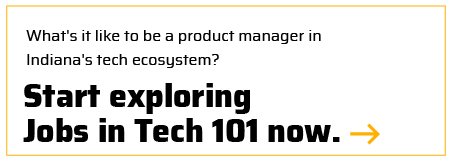Meet Ashton Chaffee, Product Manager at Zylo
Employer: Zylo
Job Title: Product Manager
Degree Path: BS from Butler University, 2011; MBA from University of Chicago Booth School of Business, 2015; Certified Scrum Product Owner
Hometown: Noblesville, IN
Current City: Fishers, IN
What led you to your getting into tech and this occupation? What was your first job in tech?
At the time when I was entering the workforce, the Orr Fellowship had many host companies that were tech-forward. At both Slane and DinnerCall, we had a big focus on developing tech solutions for traditionally underserved markets (coat checking and grocery, respectively). So, from the very beginning, I was involved in tech, somewhat inadvertently. Additionally, that seemed to be a time when many tech startups and meetups were just gaining traction, and I got a lot of exposure to local companies, groups, and founders via that experience. Since then, Indy has become even more of a hotbed for tech startups, which has lead to more opportunity for the community as a whole.
What has been your career path so far?
I started my career with Slane Capital Partners as an Orr Fellow. At Slane, I got to experience many sides of business, as we invested in first time founders and partnered with them directly. That meant I got to try out everything from product wireframing and strategy, to marketing and customer service, to investing, social media management, website design, and all that lies in between. After about 5 years, one of the partners at Slane and I decided to spin a product we were working on internally off into its own separate entity. I served as co-founder and President of that organization for about two years. At the same time, I also completed my MBA from the University of Chicago Booth School of Business by commuting to Chicago on the weekends. After leaving the company I helped found, I got to bring all of my diverse experiences and skills together as Product Manager at Zylo.

When you think of a day in your life, what are the main work activities you do or responsibilities you have?
On any given day, I spend time writing stories for upcoming work, prioritizing upcoming work, having strategy meetings with our VP of Product, talking with customer success about needs they’re hearing from customers, working with or meeting with our engineers to problem solve or further define usability requirements, and researching or scoping out new features we’d like to build in the future.
Help us picture your work environment.
I work in the office most days of the week, but I do have the flexibility to work from home as necessary. While our team is very connected via Slack, it’s always helpful to meet people face to face to talk through feedback, questions, solutions, and upcoming work strategy. I primarily work with and through people, but there are times when I research, plan, and brainstorm alone. Product Management can be a very social job, as you are constantly talking with people all throughout the company. There’s a nice mix of desk work and in-person or call-in meetings – enough that you know you’ll be able to “change scenery” several times throughout the day.
What do you love about the work you do?
I love that I get to work with almost every area of the company on any given day. While I work most closely with engineering to prioritize work and see it through, I also interface with marketing, customer success, and the customers themselves regularly. Secondly, I also love the nature of having a direct impact on the customer experience as well as the growth of the company via a compelling product. To see features come to life and watch them make a difference in the daily operation of customers’ work lives is hugely gratifying.
Which personality traits, interests, and abilities are important or common for a person to succeed in and enjoy this occupation?
PMs need to have a natural curiosity and desire to solve complex problems. You need to be comfortable asking questions and not being the smartest person in the room in any given topic. What I mean by that is, oftentimes, you as the PM will not have all the answers; you need to be skilled at asking the right questions of the right people to find the most informed path forward. You then need to be able to synthesize those various opinions and inputs into products and features that make business sense. You also need to be able to advocate for the decisions you make and give solid reasoning why various elements are prioritized in the roadmap (this is why so many PMs make data-driven decisions!).
Which tools/technologies or technical skills are particularly important for a person in your job to be proficient in?
The tools and technologies that PMs use are as diverse as the companies they work in. Personally, I have used everything from Slack to JIRA to trello to Asana to productboard to mixpanel to periscope (not to mention the semi-obvious Gsuite / GDrive) and have probably tested a dozen more. You’ll come into an atmosphere where something is already being used, learn it, and either make it more effective or figure out what to switch over to optimize your team. It’s a lot of test and learn, but the main point is to find what helps your team stay organized and communicate effectively. That said, I’d focus less on the technical tools and look more to the soft skills that are necessary – namely, creative thinking, strategic planning, and communication.
Which soft skills (aka general business skills or employability skills) are particularly important for a person in this occupation to be proficient in?
As previously mentioned, creative thinking, strategic planning, and communication are all cornerstones of product management. Creative thinking comes into play because, as a product manager, you are looking to solve problems through your product. How can you offer something that provides unique value, is sticky for the customer, can be built in a reasonable amount of time, utilizes resources well, and fits into the overall product roadmap and vision? Those are key questions product managers look to solve daily, and it takes constant communication with engineering, customer account managers, leadership, and customers themselves to gain insight into what needs to be done and how. Without effective communication skills, you will be lost as a PM. Finally, you must take all of this information and synthesize it into a strategic product plan, weighing timelines, commitments, and resources.
From your experience with new grads applying for and beginning jobs in this occupation, are they missing any particular knowledge, skills, or experiences that hold them back? Please describe.
Experience is key to effective product management. Oftentimes, product management roles require at least a few years of experience, if not 5-7+ (depending on product and size of company). If new grads are interested in becoming product managers, they should look to first get some business experience in an industry they’re excited about or with a company they’d love to grow in, look for product managers that might be willing to mentor them or coach them along the career path, and really dive in to learning about different functions within the business so that when the time comes, they’ll have a broader understanding of the business as a whole.
Which resources, people, books, websites, etc. would you recommend to those who want to learn more or advance their skills in this occupation?
Product Management is a funny discipline. As far as I can tell, many people have historically “just fallen into it” at some point in their career, without necessarily starting with product management as an end goal in mind (this does, however, seem to be changing as it becomes more and more of a desirable career path). Because of that, there aren’t a lot of hard tools or classes out there that can fully teach a person the “how’s”…much of it comes from on-the-job experience. Of course, there are tens of dozens of blogs and articles about the practice, what it involves, and lessons from others’ experience. By and large, though, the best ways to learn more about product management and gain skills in order to advance in the PM career path include 3 things: time, experience, and being around others in the profession. When you surround yourself with other PMs – from other companies, within your company, via meet up groups, etc – you are able to bounce ideas and practices off one another and virtually compound your experiences as each of you tries new processes and practices. Experience is just how it sounds – you need to be in the job day in and day out, working with and through others to figure out what works best for you, your team(s), and your organization as a whole. It’s a lot of trial and error, and no two PMs manage the same. And finally, you need time. Product Management is such a far-reaching field because you interact with people from all over your organization…from engineering to marketing to customer success to leadership and even to the customers themselves. Because of this, it usually takes time to grow and facilitate these relationships and to become familiar with other areas of your company. The most effective product managers are well-rounded, have worked in other areas of the business, and learn over time how to connect and synthesize feedback and needs from all areas of the business.
What encouragement or advice would you offer to others considering this occupation or wanting to stand out amongst others?
If you’re looking to make a change or think product management sounds interesting – great news! Quite literally any background can transition into product management, as long as a few key skill sets are there and you have a natural curiosity and drive to solve complex problems.




